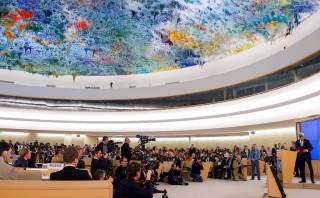Human Rights: Early days or End of Times?
10 December 2015
Iris Baño Romero (MSc Global Governance and Ethics) on a GGI keynote lecture with Morten Kjaerum.

Are Human Rights fading fast? Or are they newborns in need of care and nurturing in order to mature? Morten Kjaerum, Director of the Raoul Wallenberg Institute of Human Rights and Humanitarian Law in Sweden, discussed the direction that Human Rights are taking in the conference "Human Rights, early days or end of times?" organized by the Global Governance Institute on 3 November 2015.
A change of focus: human rights on the ground
On first impressions, the human rights picture in Europe looks rather dark nowadays. Serious challenges such as the Syrian refugee crisis, the fight against terrorism, and the entrance of new member states which display serious rights deficiencies are some of the challenges that the continent faces today. Readers might justifiably conclude that the end times of human rights is approaching.
Morten Kjaerum however, believes that those predicting the demise of human rights are mistaken. According to this expert, the impact of human rights as a discourse is as vital today as ever. In order to see this it is necessary to focus on the way in which it informs mobilisations efforts "on the ground, where people live". His vision aligns with Eleanor Roosevelt's famous statement:
Where, after all, do universal human rights begin? In small places, close to home - so close and so small that they cannot be seen on any maps of the world. Yet they are the world of the individual person; the neighbourhood he lives in; the school or college he attends; the factory, farm or office where he works
Three phases in human rights
Kjaerum presented a loose periodisation of human rights in three different phases. The first period begins after the Second World War with the elaboration of the Universal Declaration of Human Rights and extends to the conventions of the 1960s and beyond. Progress was most visible in norm-making, less so in implementation due to the sterile positioning of the Cold War. Human rights concerns in Europe received very little attention during this era, with much of the attention focused on apartheid in South Africa and the violent dictatorships in Latin America.
The fall of the Berlin Wall marked the beginning of the second phase. In this new era, human rights progressed beyond norm-making with an operational turn towards implementation in domestic jurisdictions. During the previous decades, human rights in Europe had been relegated to the margins. This all changed now, with the number of court cases and legal decisions in Europe increasing exponentially in the 1990s. Furthermore, National Human Rights Institutions or NHRIs began to proliferate in Europe with human rights occupying an increasingly dense regulatory space within and above the member states.
Kjaerum identifies the third phase as occurring somewhere in the post 9/11 decade. This phase has been defined by three core elements: (1) a serious effort to enhance the evidence-based surrounding human rights violations and remedy; (2) debate surrounding how to enhance the actual performance of human rights institutions; and (3) attempts to mainstream human rights into other substantive domains, including security and trade.
The current era
With norms established as guiding principles, Kjaerum remarks that we need to move from casuistic to evidence-based interventions. We need to take full advantage of powerful new methodologies in the social sciences and statistics to evaluate when, how and why the human rights system actually matters for victims of human rights violations. We need to transcend a concern for parchment text, "lots of states write beautiful legislation which has limited or no impact".
Moving towards an evidence-based approach requires institutions to be efficient and accountable. In order to achieve this objective, Kjaerum declares that "it is necessary to connect all the dots in Europe"; meaning that not only governments, but also national institutions, academia and other members of civil society need to be on board. Building trust and encouraging dialogue among different actors is vital: "we need to bring them all together so that they can agree to disagree".
The third dimension of the present era is the importance of integrating human rights into public policy across all domains, including security and trade. According to Kjaerum, after 9/11 the world forgot about human rights. "Now it is all about security". However, it is important to not lose sight of the importance of a human rights lens in devising public policy. In its absence, you risk injustice.
Prospects for human rights
Kjaerum maintains that today human rights are stronger than ever: "They are omnipresent and connect a broad institutional landscape". Although human rights remains subject to the charges of being too narrowly issue-driven or illegitimately intruding upon states' sovereignty, Kjaerum remains convinced that instead of shutting down discussion by proclaiming the end times of human rights, it is more productive to acknowledge that the future of human rights is open-ended and still offers a powerful language through to address the myriad social challenges we confront today. What will phase four look like? We will have to wait and see.
Morten Kjaerum is Director of the Raoul Wallenberg Institute of Human Rights and Humanitarian Law in Sweden since 2015. Prior to that he was the first Director of the European Union Agency for Fundamental Rights (FRA) in Vienna from 2008 to 2015. He was also the founding Director of the Danish Institute for Human Rights (DIHR) from 1991 to 2008.
 Close
Close


